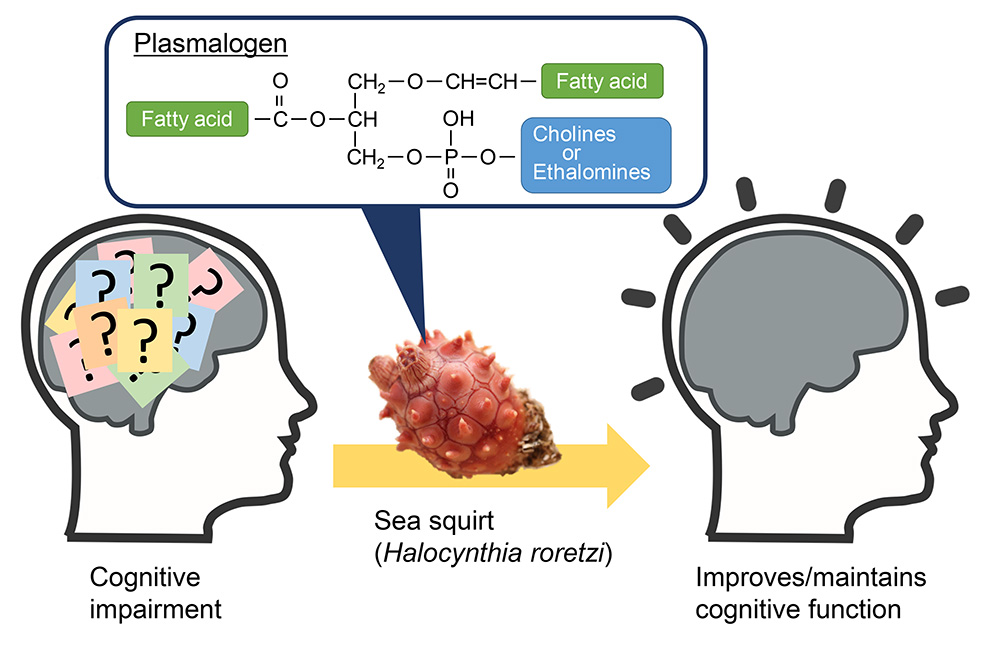- 著者
- Hirofumi Watanabe Masaki Okawara Yoshiharu Matahira Takashi Mano Tatsuya Wada Naoko Suzuki Tsuyoshi Takara
- 出版者
- Japan Oil Chemists' Society
- 雑誌
- Journal of Oleo Science (ISSN:13458957)
- 巻号頁・発行日
- vol.69, no.12, pp.1597-1607, 2020 (Released:2020-12-01)
- 参考文献数
- 18
- 被引用文献数
- 9
Objectives: Plasmalogen, phospholipids with previously shown associations with dementia, has attracted attention as a substance found in some studies to improve cognitive function. The effects of ascidian-derived plasmalogens on cognitive performance improvement were assessed in a randomized, double-blind, placebo-controlled study including Japanese adult volunteers with mild forgetfulness.Methods: Participants consumed either the active food containing ascidian-derived plasmalogen (1 mg as plasmalogen) or the placebo food for 12 weeks, and their cognitive performance was assessed by Cognitrax. Participants were randomly allocated into the intervention (ascidian-derived plasmalogen; 8 males, and 17 females; 45.6 ± 11.1 years) or the placebo (9 males, and 15 females; mean age, 46.4 ± 10.8 years) group. Results: Compared to the placebo group, the intervention group showed a significant increase score in composite memory (eight weeks: 3.0 ± 16.3 points, 12 weeks: 6.7 ± 17.5 points), which was defined as the sum of verbal and visual memory scores.Conclusions: These results indicate the consumption of ascidian-derived plasmalogen maintains and enhances memory function. This study was registered at the University Hospital Medical Information Network Clinical Trial Registry (UMIN-CTR, registry no. UMIN000026297). This study did not receive any specific grant from funding agencies in the public, commercial, or not-for-profit sectors.
- 著者
- Tsuyoshi Takara Kazuo Yamamoto Naoko Suzuki Shin-ichiro Iio Hayata Noguchi Toshihiro Kakinuma Asami Baba Wakana Yamada Masafumi Nagata Hiroshi Shimoda
- 出版者
- Society for Glycative Stress Research
- 雑誌
- Glycative Stress Research (ISSN:21883602)
- 巻号頁・発行日
- vol.9, no.3, pp.158-169, 2022-10-20 (Released:2022-10-26)
- 参考文献数
- 52
Background and objective: Plant-derived glucosylceramides (GlcCer) have been clinically reported to enhance skin barrier functions. GlcCer and ceramides (Cer) interact with immune-stimulating receptors on antigen-presenting cells, such as c-type lectin receptors and toll-like receptor 4. However, the clinical and immunological efficacies of orally ingested GlcCer remain unknown. Therefore, we herein conducted a clinical trial on the effects of rice-derived GlcCer (Oryza Ceramide®: OC) on cold symptoms, immune parameters, and SF-36 scores. Methods: OC (type PCD, 60 mg daily) containing 1.8 mg of GlcCer and 0.09 mg of Cer [t18:0/24:0] was used as the active sample. We enrolled 44 healthy Japanese individuals who are prone to catching colds and a low immune score. All subjects were randomly allocated to an active group (n = 22) or placebo group (n = 22). Capsules containing OC or the placebo were administered for 8 weeks. Cold symptom scores during the intervention were the primary outcome, while immune parameters and SF-36 scores measured after the 8-week intervention were the secondary outcomes. Results: Forty subjects completed the trial, and the per protocol set comprised 19 and 21 in the active and placebo groups, respectively. Regarding the primary outcome, cumulative days with cold symptoms, such as nasal congestion, throat irritation, a cough, headache, muscle pain, and diarrhea, was lower in the OC group. Among the secondary outcomes, physical functioning in SF-36 scores was improved in the OC group. Regarding immune parameters, a negative correlation was observed between changes in blood T-lymphocytes and cumulative days with cold symptoms. Laboratory tests revealed no abnormalities to suggest adverse effects of OC. Conclusions: OC consisting of GlcCer attenuated typical cold symptoms, such as nasal congestion, throat irritation, a cough, headache, muscle pain, and diarrhea, and improved physical conditions. Changes in T-lymphocytes may be one of the mechanisms by which OC ameliorates cold symptoms.
